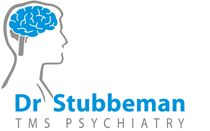
Latest News and Research


Local psychiatrists use pulsed electromagnetic waves to treat depression
With progress at fighting her depression at a standstill, Hoffman’s therapist suggested that she contact South Charleston psychiatrist Dr. Dan Thistlethwaite at PsyCare Inc. to see if she was a good candidate for Transcranial Magnetic Stimulation, or TMS — a relatively new method of treating depression by directing pulses of stimulating electromagnetic energy to nerve cells in areas of the brain that involve mood control.
New non-medicinal treatment helps with depression
Fifteen million Americans live with depression. The most common way they’re treating it is with anti-depressant drugs, but half of them either can’t tolerate the medicine, or they aren’t responding to it. Now doctors are using a non-invasive treatment for depression, and it seems to be offering promising results.
High-Frequency Repetitive Transcranial Magnetic Stimulation (rTMS) Improves Functional Recovery by Enhancing Neurogenesis and Activating BDNF/TrkB Signaling in Ischemic Rats
Repetitive transcranial magnetic stimulation (rTMS) has rapidly become an attractive therapeutic approach for stroke. However, the mechanisms underlying this remain elusive. This study aimed to investigate whether high-frequency rTMS improves functional recovery mediated by enhanced neurogenesis and activation of brain-derived neurotrophic factor (BDNF)/tropomyosin-related kinase B (TrkB) pathway and to compare the effect of conventional 20 Hz rTMS and intermittent theta burst stimulation (iTBS) on ischemic rats. Rats after rTMS were sacrificed seven and 14 days after middle cerebral artery occlusion (MCAO), following evaluation of neurological function.
Targeting depression: Treatment uses magnetic pulses to reduce, eliminate symptoms
A recently opened clinic in Durango is now offering a new, drug-free treatment for patients suffering from depression that has just about the same success rate as prescribed medication. “This is really becoming a popular form of treatment that, unlike medication, has no side effects,” said Daniel Caplin, a doctor of osteopathic medicine and owner/medical director of Suttle Street Clinic. “And people want holistic cures rather than depending on medication.
Psychiatrist offers new technology to battle depression
“This technology can be used instead of medication,” said Ablow, who is also a well-known author. “It can be appropriate for those who are profoundly depressed or for whom other solutions have not been successful. This is a well-tolerated solution that the data shows is very effective.” His mini-practice is known as New England TMS, and his office is one of the few in northern New England to be employing the technology, known as dTMS, or deep Transcranial Magnetic Simulation.
Transcranial DC Stimulation: Ready for Regular Use in Treating Major Depression?
Studies of transcranial direct-current stimulation (tDCS), which is one of several emerging biological nonpharmacologic interventions proposed to treat depression, have had mixed results. Now a team of investigators[1] from the University of São Paulo, Brazil, have undertaken a systematic review and meta-analysis of individual patient data to assess tDCS efficacy and explore individual response predictors.
Local Clinic Offers Drug Free Depression Treatment
ALBUQUERQUE, N.M. (KRQE) – A local clinic is now offering depression patients a new drug-free treatment to help battle the disorder. The treatment, Transcranial Magnetic Stimulation (TMS), employs highly focused magnetic pulses to painlessly stimulate key neurons in the brain and clear away the dark clouds of the disorder. Albuquerque Psychiatrist, Dr. Ruben Sutter, joined KRQE’s This Morning team to discuss the procedure.
TMS Approaches for Major Depression: Is There a Clear Winner?
There are few differences in clinical efficacy and tolerability with different types of repetitive transcranial magnetic stimulation (rTMS) for major depression, new research shows. A systematic review of randomized clinical trials comparing the efficacy and tolerability of rTMS modalities showed they were largely equal but, to some extent, favored bilateral rTMS and priming low-frequency rTMS in the treatment of major depressive disorder (MDD).
